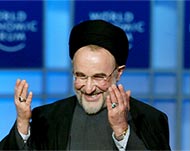Iranian MPs change electoral law
The Iranian parliament has approved changes to the electoral law after a conservative-controlled vetting body disqualified several reformist candidates from contesting forthcoming elections.

The reformist majority in parliament on Sunday proposed two amendments to the law to make it easier for candidates to stand for election.
They would prevent the powerful Guardians Council from disqualifying sitting MPs unless they had been convicted of a criminal offence.
However, the amendments, approved after an emergency debate, have to be endorsed by the Guardians Council.
The body, which vets legislation and candidates for office, set off a political storm this month when it barred 3605 of 8157 prospective candidates, most of them reformers, from standing in the 20 February election.
Khatami urges review
 |
|
Khatami has called for a review |
Earlier, President Muhammad Khatami and the speaker of parliament, Mahdi Karubi, demanded a “full review” of the Guardians Council decision.
The two reformists called in a rare joint statement for a “full review of the Guardians Council decision to have elections that are fair, free and open to competition,” according to the IRNA news agency.
They added that the review should take place “as soon as possible.”
Among those rejected for alleged failures to respect Islam or the constitution are 80 sitting MPs, as well as other prominent figures.
Supreme Leader Ayat Allah Ali Khamenei ordered the council last week to be less stringent in its vetting procedure in an apparent bid to resolve the crisis, but only about 300 of the rejected candidates have now been approved.
Joint appeal
Khatami and Karubi argued that “a religious democracy does not deserve an election where there will be no competition for 190 seats (in the 290 seat Majlis) and where… the process favours only one camp”.
According to press reports on Saturday, more than 70 deputy ministers and senior bureaucrats – including 16 from the vital oil ministry – have submitted their resignations in response to the standoff.
Several dozen reformists MPs were also continuing a sit-in protest launched when the Guardians Council issued its blacklist on 11 January.
The council has until 30 January to certify the final list of candidates to the interior ministry, which is responsible for
organising the polls.